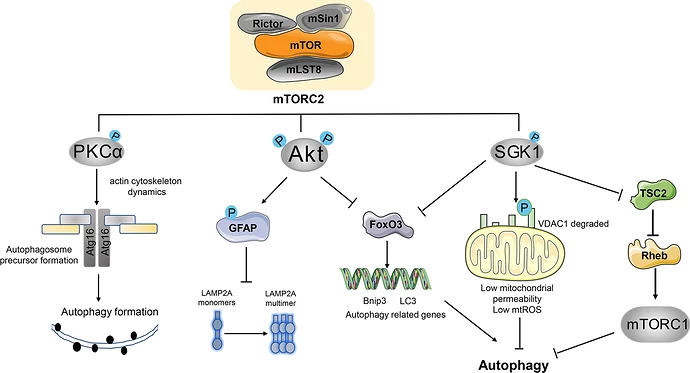New mTOR2 paper (open access):
Autophagy is a multi-step catabolic process that delivers cellular components to lysosomes for degradation and recycling. The dysregulation of this precisely controlled process disrupts cellular homeostasis and leads to many pathophysiological conditions. The mechanistic target of rapamycin (mTOR) is a central nutrient sensor that integrates growth signals with anabolism to fulfil biosynthetic and bioenergetic requirements. mTOR nucleates two distinct evolutionarily conserved complexes (mTORC1 and mTORC2). However, only mTORC1 is acutely inhibited by rapamycin. Consequently, mTORC1 is a well characterized regulator of autophagy. While less is known about mTORC2, the availability of acute small molecule inhibitors and multiple genetic models has led to increased understanding about the role of mTORC2 in autophagy. Emerging evidence suggests that the regulation of mTORC2 in autophagy is mainly through its downstream effector proteins, and is variable under different conditions and cellular contexts. Here, we review recent advances that describe a role for mTORC2 in this catabolic process, and propose that mTORC2 could be a potential clinical target for the treatment of autophagy-related diseases.
The main pathology of neurodegenerative diseases, including Alzheimer’s diseases (AD), Parkinson diseases (PD), amyotrophic lateral sclerosis (ALS) and the polyglutamine (ploy Q) diseases, is a low level of autophagy and accumulation of misfolded proteins and damaged organelles in neurocyte [10]. Deregulation of autophagy is also involved in the pathogenesis of cancers. While the role of autophagy in cancer is controversial, which depends on the type and stage of cancers [11]. At the preliminary stage of cancer, autophagy can slow down the transformation of normal cells into tumor cells by protecting cells from ROS-induced damage to DNA and proteins [12]. At the late stages, autophagy has a tumor promotion effect through limiting DNA damage and supplies available nutrients [13]. So understanding the role of the autophagy in cancers is essential for cancer management.
